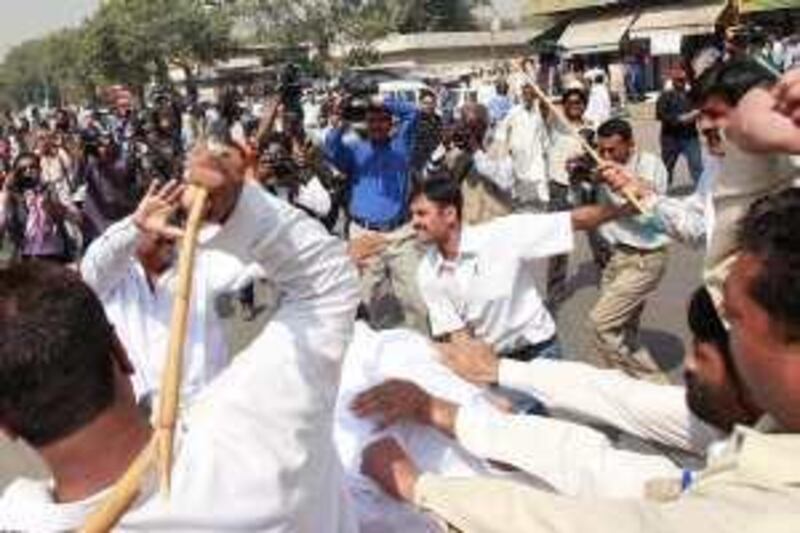Islamabad // Pakistan's president, Asif Zardari, came under intense pressure to reach a compromise with opposition leaders yesterday as his government faced nationwide protests calling for the reinstatement of judges fired by former president Pervez Musharraf. Pakistani lawyers and opposition activists launched protests across the country ahead of a planned showdown with the Pakistan People's Party (PPP) government in the capital, Islamabad, on Monday, as the government struggles with an economic crisis and militant violence.
Police had arrested hundreds of lawyers and activists on Wednesday in an effort to prevent the demonstrations, invoking a tactic Mr Musharraf used against the PPP a year ago. The march could strike a serious blow against Mr Zardari, the widower of the assassinated former prime minister, Benazir Bhutto. Mr Zardari's party was engaged in intense political horse-trading with all sides yesterday, including his arch-rival, the former prime minister, Nawaz Sharif, looking for supporters to bolster his shaky government.
Aitzaz Ahsan, the leader of the powerful lawyers' movement, said in an interview mass protests against the government would continue for months if demands were not met. "It is the cause, not the symptoms, of the unrest that need to be addressed," he said. The lawyers, who are spearheading the so-called Long March, insist the president must honour his pledge to restore the former chief justice, Iftikhar Chaudhry, who was sacked by Mr Musharraf. Mr Zardari is reluctant to do so as Mr Chaudhry opposed an amnesty granted by Mr Musharraf absolving him of charges relating to the embezzlement of millions of dollars during his wife's two tenures.
Mr Zardari has banned protests in two of the country's four provinces, Punjab and Sind, and Rehman Malik, the head of the interior ministry has threatened Mr Sharif and other leaders with charges of sedition. The crackdown stands to damage the PPP's already-bruised democratic credentials. Still, about 2,000 lawyers, political workers and civil activists rallied in Lahore, the capital of Punjab, shouting "Zardari is a dog" and "Long March, Long March", clashing briefly with police.
And about 100 members of the conservative Islamist Jamaat-e-Islami party allied with the lawyers scuffled with police who stopped them entering Karachi's High Court. "I disagree with Mr Zardari's policies. He has reneged on his promises to restore the chief justice thrice - a promise that his late wife also made," said Mr Ahsan. Mr Zardari has also reneged on a promise to rescind the presidential power to dismiss parliament once he became president.
Mr Ahsan said his movement did "not intend to topple the government" but said Pakistan deserved an independent judiciary. Mr Ahsan, a senior PPP member, has been suspended from the party's central executive committee. Senior US and British diplomats have been meeting all parties in recent days in an effort to work out a compromise, fearing that more political upheaval will yet again distract the country's leadership from confronting an al Qa'eda- and Taliban-inspired campaign of violence.
"Our biggest concern, of course, is that the situation will become violent and then start to spiral downward," said a US official in Washington who spoke on condition of anonymity. Last week, Britain appealed for political unity, saying the bickering was distracting Pakistan from the "mortal threat" posed by al Qa'eda and the Taliban. A western diplomat said Mr Zardari had "overplayed his hand". Mr Ahsan decried western attempts to sideline the lawyers' movement. "Britain and America treat us like a pariah - as if there is no need for a judiciary in Pakistan," he said.
For much of the PPP's one year in power, Pakistan has been deadlocked by the power struggle between Mr Zardari and Mr Sharif's Pakistan Muslim League (PML-N). Two weeks ago Mr Zardari moved against Mr Sharif in the hope of crushing his rival. The Supreme Court banned Mr Sharif and his brother, Shahbaz Sharif, the Punjab province's governor, from holding office. Mr Zardari then imposed his own rule in the province through his governor. But he appears to have underestimated Mr Sharif's power base.
Mr Zardari's aloof style of leadership has alienated much of the public as well as many within his own party. "There is a gulf between the government and the people," said Naheed Khan, Benazir Bhutto's former political secretary, adding that she opposed the crackdown and that Mr Zardari should restore the chief justice. "I would never support the arrest of political workers. Mr Zardari should have more contact with the people and should have more sane advisers around him," she said.
The president has also failed to win the sympathy of the all-powerful army. The army chief, Gen Ashfaq Kiyani, although reluctant to publicly bring the military back into politics, has reportedly given the president a deadline to restore some political stability Mr Zardari was last night attempting to garner support from the Pakistan Muslim League (Quaid-e-Azam), or PML-Q, the party created by Mr Musharraf.
"It is sad. A year ago Mr Zardari called the PML-Q the 'Killer League' after his wife named them as being responsible for an attack on her," said Mr Ahsan. "Now he is trying to do a deal with them." iwilkinson@thenational.ae





